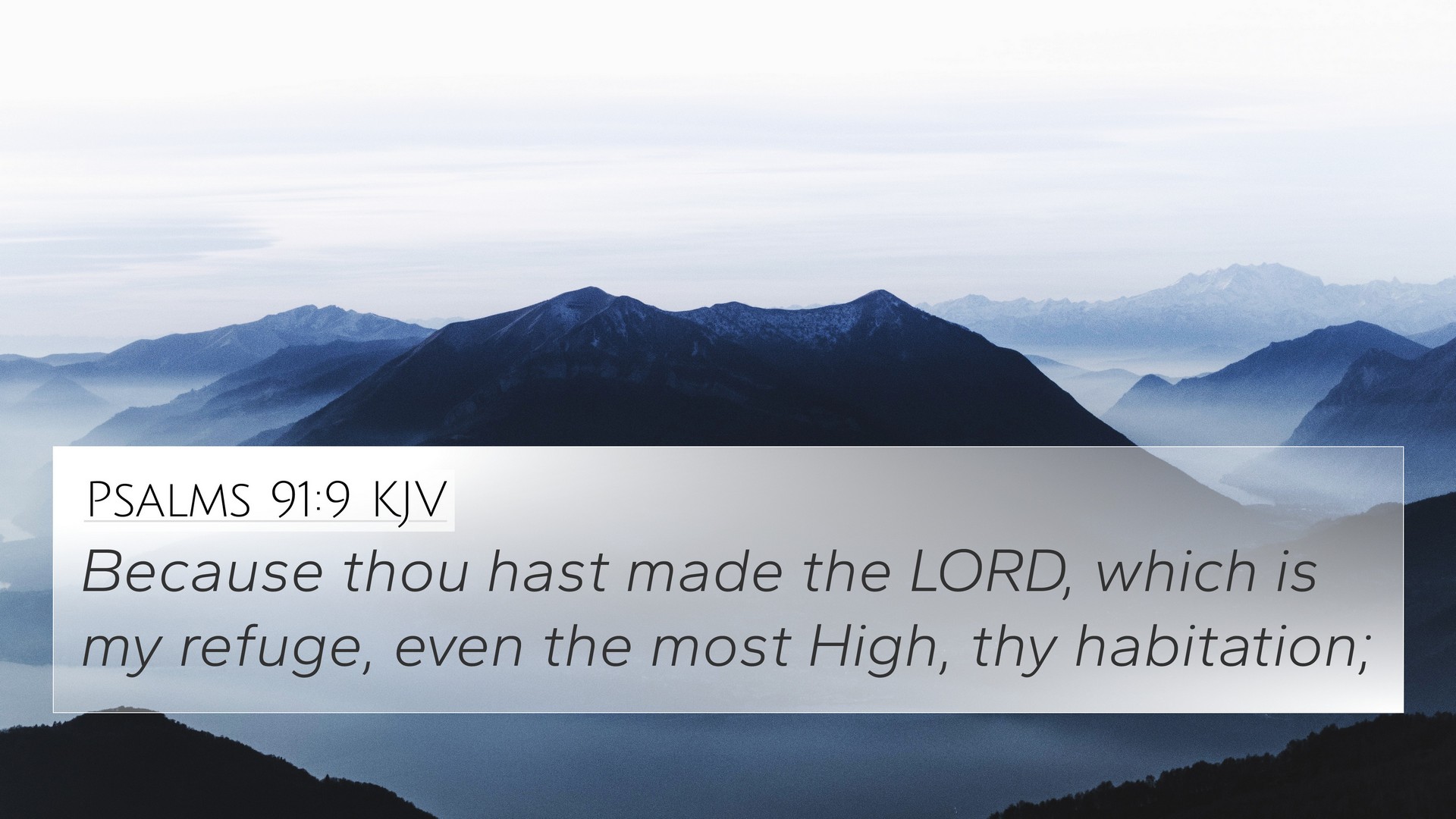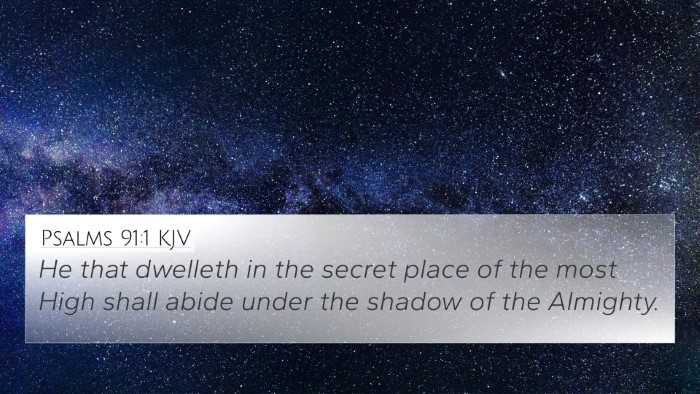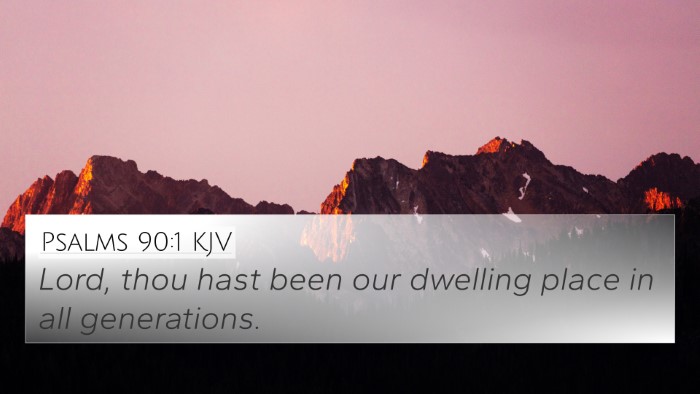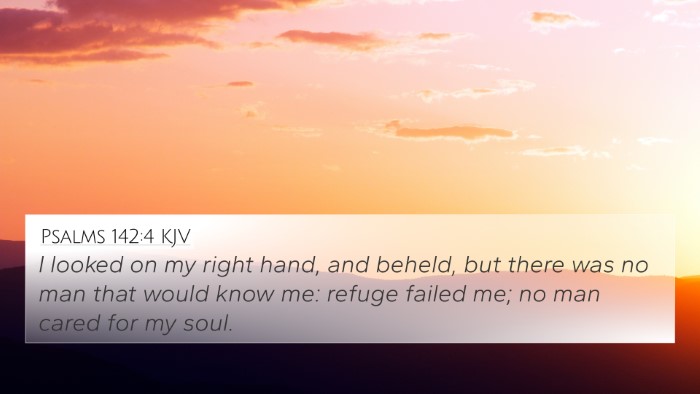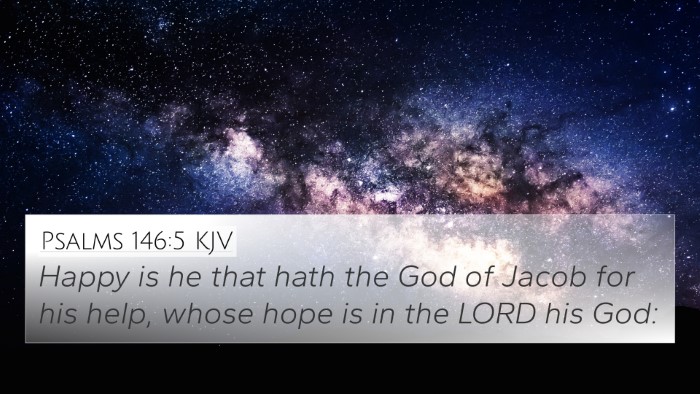Psalms 91:9 - Meaning and Interpretation
Verse: "Because you have made the LORD your dwelling place—the Most High, who is my refuge—" (Psalms 91:9, ESV)
Summary of Psalms 91:9
Psalms 91:9 is a profound expression of faith and trust in God as a refuge for believers. This verse emphasizes the significance of making the Lord one's dwelling place, indicating a deep relationship with the Almighty. The assurance found in this Psalm is rooted in the intimate connection between man and God.
Combined Insights from Public Domain Commentaries
This verse has been analyzed from various perspectives by scholars such as Matthew Henry, Albert Barnes, and Adam Clarke. Below are summarized insights:
- Matthew Henry: He emphasizes the believer's commitment to God, reflecting on the idea that choosing God as a dwelling place leads to safety and security. Henry notes that this choice signifies a rejecting of worldly dwellings and emphasizes living in communion with God.
- Albert Barnes: Barnes interprets the "Most High" as a title highlighting God's supremacy and power. He connects this verse to the promise of divine protection, affirming that those who trust in Him will find their refuge and safety. He encourages believers to see God as their unwavering source of support.
- Adam Clarke: Clarke relates this verse to the idea of the Holy Spirit guiding the believer. He suggests that making the Lord a “dwelling place” conveys both physical and spiritual security. Clarke also mentions the conditional aspect of this promise which requires faithfulness to God in order to acquire the benefits mentioned.
Spiritual Insights
The insights of these commentators combine to show that Psalms 91:9 is a invitation to faithfulness and trust in God. The verse underlines:
- Faith as a dwelling: Making God one's dwelling reflects unwavering faith and dependence.
- Divine protection: The promise that those who trust in the Lord will be safeguarded against adversities.
- Commitment to God: Living a life committed to God is not just about seeking refuge during trials but making Him central to all aspects of life.
Connections Between Bible Verses
Psalms 91:9 resonates with several other scripture passages that reinforce the themes of refuge, trust, and divine protection. Below are 10 Bible cross-references that relate to this verse:
- Psalm 46:1: "God is our refuge and strength, a very present help in trouble." - This passage reinforces the theme of God as a shelter in times of distress.
- Proverbs 18:10: "The name of the LORD is a strong tower; the righteous run into it and are safe." - Highlights safety found in God's name and presence.
- Isaiah 40:31: "But those who wait for the LORD shall renew their strength; they shall mount up with wings like eagles; they shall run and not be weary; they shall walk and not faint." - Suggests that trust in God leads to rejuvenation and strength.
- Psalm 23:1: "The LORD is my shepherd; I shall not want." - Portrays God’s provision and care for those who follow Him.
- 2 Thessalonians 3:3: "But the Lord is faithful. He will establish you and guard you against the evil one." - Reminds believers of God’s faithful protection.
- Hebrews 13:6: "So we can say with confidence, 'The Lord is my helper; I will not be afraid. What can mere mortals do to me?'" - Encourages steadfastness and reliance on God despite mortal fears.
- Psalm 121:7-8: "The LORD will keep you from all evil; he will keep your life. The LORD will keep your going out and your coming in from this time forth and forevermore." - Affirms ongoing divine protection in life’s journeys.
- Matthew 11:28: "Come to me, all you who are weary and burdened, and I will give you rest." - Invites those in turmoil to seek refuge in Jesus.
- Romans 8:31: "What then shall we say to these things? If God is for us, who can be against us?" - Affirms that God’s support outweighs any adversities faced in life.
- Psalm 62:6: "He only is my rock and my salvation, my fortress; I shall not be shaken." - Expresses deep trust in God as a solid foundation.
Understanding Through Cross-Referencing
This verse, and its themes of refuge, trust, and commitment to God, can be explored deeply through various methods of cross-referencing.
By employing a Bible concordance or using a Bible cross-reference guide, believers can study these connections to gain a fuller understanding of their faith. Here are a few tips on utilizing cross-references:
- Utilize a cross-reference Bible study method to examine how different passages relate.
- Identify thematic Bible verse connections by examining common themes across the verses.
- Explore both Old and New Testament connections to grasp the continuity in God's promises and character.
- Consider the historical context to better understand how these verses have guided believers through centuries.
Conclusion
Psalms 91:9 serves as a poignant reminder of the protective nature of God and the profundity of a faithful relationship with Him. Through careful examination of this verse alongside related scriptures, believers can find comfort, strength, and reassurance in God's enduring presence. Embracing such passages in personal study allows for a richer understanding of the inter-Biblical dialogue and the cohesive narrative of God’s love and protection throughout Scripture.
